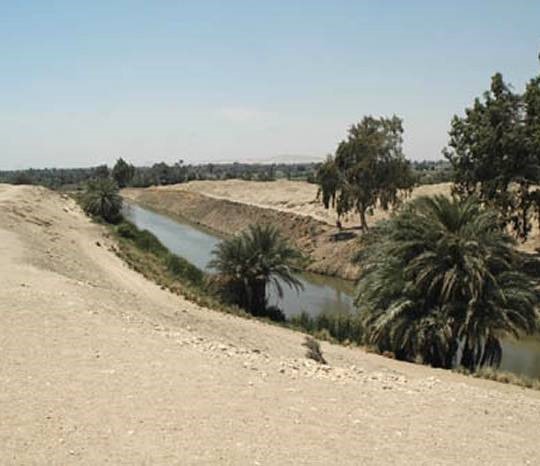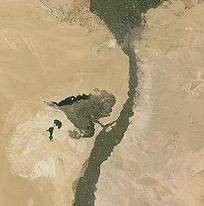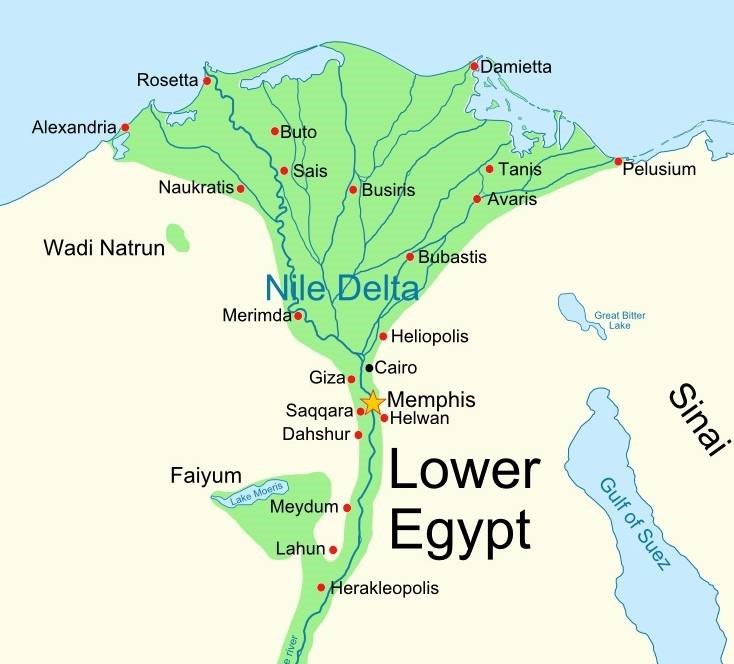Perhaps the number one question that people wonder about is, "what does faith mean?" This poses a problem for all religions and most, if not all,
fail to answer the question objectively. You get so many squirrely answers that it becomes apparent that it's subjective or it doesn't really make sense.
"It feels true or right" never cut it with me. In my mind, the question of which religion was true depended on whether it was objectively true or not –
not simply how I felt nor because someone I trusted told me so.
Three months after the Exodus, God defines to Moses what faith is:
And Moses went up to God, and the Lord called to him from the mountain, saying, "This is what you shall say to the house of Jacob
and tell the sons of Israel: 'You yourselves have seen what I did to the Egyptians, and how I carried you on eagles' wings, and brought you to Myself.
Now then, if you will indeed obey My voice and keep My covenant, then you shall be My own possession among all the peoples, for all the earth is Mine;
(Ex 19:3-5)
According to God, faith means:
1. A belief that the invisible God is real and true ("You yourselves have seen what I did").
2. A trust of His word that engenders obedience ("if you will indeed obey My voice and keep My covenant, then you shall be My own
possession among all the peoples").
So if Exodus is the event that reveals that God is historically real, true, and alive, then it makes sense to determine if there is any evidence of this
very ancient event. Along the same line of reasoning is looking for evidence that establishes the existence of Jews in Egypt before the Exodus.
The Waterway of Joseph (Bahr Yussef) can be seen today as a canal connecting the Nile River with Lake Moeris in the area of the Faiyum Oasis. No one knows
how this 200 mile waterway came to commemorate a non-Egyptian name, but its function was to: a) control the flooding of the Nile River, b) regulate the level
of the Nile River in the summer, and c) provide irrigation for the immediate area. The Waterway of Joseph is dated to the reign of Amenemhat III and the early
rise of the city of Avaris in the region of Goshen.

The Canal of Joseph


The Faiyum Oasis
Nile flood records, discovered in 1844, were inscriptions on a cliff face marking the flood heights of the Nile. During the reign of
Amenemhat III (12th dynasty), consecutive years were found to have floods 9 meters over normal or 4x normal volume of water.
The construction of the Canal of Joseph reclaimed over 150,000 acres of the marshy Faiyum Oasis. Amenemhat III would celebrate this
accomplishment and chose to be entombed in a pyramid in Dahshūr nearby.
The only ancient historical record that may be associated with this canal is found in the Bible, and it is the narrative of Joseph.
Betrayed by his brothers, Joseph is sold as a slave:
Meanwhile, the Midianites sold him in Egypt to Potiphar, Pharaoh's officer, the captain of the bodyguard.
(Gen 37:36)
Now Joseph had been taken down to Egypt; and Potiphar, an Egyptian officer of Pharaoh, the captain of the bodyguard, bought him
from the Ishmaelites, who had taken him down there. (Gen 39:1)
And Judah said to his brothers, "What profit is it for us to kill our brother and cover up his blood? Come, and let's sell him to
the Ishmaelites and not lay our hands on him, for he is our brother, our own flesh." And his brothers listened to him. Then some Midianite traders passed by,
so they pulled him out and lifted Joseph out of the pit, and sold him to the Ishmaelites for twenty shekels of silver. So they brought Joseph into Egypt.
(Gen 37:26-28)
The dating of the Canal of Joseph to this period is consistent and supportive of the Bible's record of Joseph preparing for the famine
(Gen 41:46-49). As the famine became increasingly severe over the seven years, the stress of buying food
increased: people exhausted their savings (Gen 41:53-57), sold their livestock to Pharaoh, and ultimately
sold their land to purchase food stored in Pharaoh's granaries. At the last resort, on the people's suggestion, Joseph adapts his plans of providing food to
people by developing an equitable tenant farmer / sharecropper solution.
Now there was no food in all the land, because the famine was very severe, so that the land of Egypt and the land of Canaan
languished because of the famine. And Joseph collected all the money that was found in the land of Egypt and in the land of Canaan in payment for the grain
which they bought, and Joseph brought the money into Pharaoh's house. When the money was all spent in the land of Egypt and in the land of Canaan, all the
Egyptians came to Joseph saying, "Give us food, for why should we die in your presence? For our money is gone." Then Joseph said, "Give up your livestock,
and I will give you food for your livestock, since your money is gone." So they brought their livestock to Joseph, and Joseph gave them food in exchange for
the horses and the flocks and the herds and the donkeys; and he fed them with food in exchange for all their livestock that year. But when that year ended,
they came to him the next year and said to him, "We will not hide from my lord the fact that our money is all spent, and the livestock are my lord's. There
is nothing left for my lord except our bodies and our lands. Why should we die before your eyes, both we and our land? Buy us and our land for food, and we
and our land will be slaves to Pharaoh. So give us seed, so that we may live and not die, and that the land may not be desolate." So Joseph bought all the
land of Egypt for Pharaoh, for every Egyptian sold his field, because the famine was severe upon them. So the land became Pharaoh's. As for the people, he
relocated them to the cities from one end of Egypt's border to the other. Only the land of the priests he did not buy, because the priests had an allotment
from Pharaoh, and they lived off the allotment which Pharaoh gave them. Therefore, they did not sell their land. Then Joseph said to the people, "Behold,
today I have purchased you and your land for Pharaoh; now, here is seed for you, and you may sow the land. At the harvest you shall give a fifth to Pharaoh,
and four-fifths shall be your own for seed of the field and for your food, and for those of your households and as food for your little ones." So they said,
"You have saved our lives! Let us find favor in the sight of my lord, and we will be Pharaoh's slaves." Joseph made it a statute concerning the land of Egypt,
valid to this day, that Pharaoh was to have the fifth; only the land of the priests did not become Pharaoh's. (Gen 47:13-26)
From an archaeological perspective, the reign of Amenemhat III is considered the Golden Age of the Middle Kingdom when Egypt experienced its highest level
of peace and economic prosperity.
Egypt was divided into territorial areas called "nomes," led by "nomarchs," who were responsible for administrative duties such as tax
collection. These "governors" had significant power and wealth, and if Pharaoh was weak, they could be strong enough to assert themselves locally or
nationally to become Pharaoh.
However, unique to Amenemhat III's reign, the nomarchs are powerless; all the wealth and power is concentrated with Pharaoh. A new
agricultural office is set up, called the Department of the People's Giving in which people sold their excess crops to the government storehouses where they
were kept and later sold / distributed in times of crisis like a famine.
This archaeological historical record of both the Canal of Joseph and the golden age of Amenemhat III appears to be consistent with the biblical account of
Joseph and correlates very well. Despite this strong circumstantial evidence, it is difficult to make the definitive claim that the biblical Joseph is the one
responsible for the Canal of Joseph and the golden age of Amenemhat III. And yet there is no other ancient historical account that explains these
archaeological data let alone as detailed as the account in the Bible.
The story of Israel in Egypt and their Exodus has long been discounted as a myth, because the archaeological evidence of past ancient events is scant.
However, discovered during 1986-88 by Manfred Bietak, a monumental statue, about 1.5x life size, was found of a non-Egyptian ruler in Avaris, Egypt.
The Egyptian statue was unusual because it featured an Asiatic skin tone and "mushroom" hair style usually associated with people from the area of Canaan.
The statue's clothing also featured a multi-colored tunic.
The Bible records this feature of Joseph:
Now Israel loved Joseph more than all his other sons, because he was the son of his old age; and he made him a multicolored tunic.
(Gen 37:3)
The statue also had a throw stick on one shoulder which was a significant symbol of political leadership. Thus this statue of a person from Canaan was
in some important leadership role in Egypt.
But that's not all…
The tomb housing the Asiatic statue was a pyramid tomb, which is only permitted for Pharaohs or high ranking Egyptians – never for non-Egyptians.
And the pyramid tomb was located in an area with 11 other tomb structures (as seen in recreation of the site).
If we use the Bible as a historical reference, this would be consistent with Joseph and his eleven brothers and their father Jacob had his name changed to
Israel:
Then God appeared to Jacob again when he came from Paddan-aram, and He blessed him. God said to him,
"Your name
is Jacob;
You shall no longer be called Jacob,
But Israel shall be your name."
So He called him Israel. (Gen 35:9-10)
Excavating ancient Avaris for 40 years (2 seasons a year), Manfred Bietak has only excavated only 3% of the city, and the challenges of the dig is
complicated by Egypt's requirement that at the end of each season, the site must be reburied. Because the site establishes the very early existence of Jews
and points to the Exodus to Canaan, Avaris is reburied and not made available to the public out of concern for the adverse political implications of the
Palestinian claim to the land of Israel.
Manfred Bietak, who is not a Christian and does not believe that the Bible is a historical record nor that these Asiatics are Jews, has made considerable
findings that correlate very well with the details of the biblical record. In light of these findings that establish Avaris and the Joseph statue around 1800
B.C. or so, it is increasingly more difficult to deny the historicity and chronology of the Bible especially when the detailed account of Joseph's political
life and role explains the archaeological findings.
While there is little acceptable direct archaeological evidence of the Exodus and Jewish migration from Egypt, there is strong circumstantial evidence of
its event (even as recently as a big finding two years ago – the Mt. Ebal curse tablet). What really matters, as to the question of faith, is whether the
archaeological data refutes the truth of the Bible.
The Exodus is not the only event that God did to make Himself real and tangible to human beings; the birth of Jesus is also another event that God used.
1. Is the invisible God objectively real and true?
It begins with the Greek name Jesus, which originates from the Hebrew name Yēšua'. The ancient form of Yēšua' was Yehôšûa', which means
"Yahweh is salvation." Yahweh is salvation is equivalent to God is salvation.
But when he had thought this over, behold, an angel of the Lord appeared to him in a dream, saying, "Joseph, son of David, do not be
afraid to take Mary as your wife; for the Child who has been conceived in her is of the Holy Spirit. She will give birth to a Son; and you shall name Him
Jesus, for He will save His people from their sins." (Matt 1:20-21)
Jesus Christ, whom historians do not deny as a fictional person, made a couple statements along these same lines to establish the reality
of God:
"But the testimony which I have is greater than the testimony of John; for the works which the Father has given Me to accomplish--the
very works that I do--testify about Me, that the Father has sent Me. And the Father who sent Me, He has testified of Me. You have neither heard His voice
at any time nor seen His form." (John 5:36-37, a reference to the Bible – God's word)
"No one has ascended into heaven, but He who descended from heaven: the Son of Man. As Moses lifted up the serpent in the
wilderness, even so must the Son of Man be lifted up; so that whoever believes will in Him have eternal life. For God so loved the world, that He gave His
only begotten Son, that whoever believes in Him shall not perish, but have eternal life. For God did not send the Son into the world to judge the world, but
that the world might be saved through Him." (John 3:13-17, a reference to Moses
[Num 21:9])
2. How does a trust in God's word engender an obedience that makes one God's own possession among all the peoples?
Jesus speaks to this issue in response to His disciple Philip who asks, "Lord, show us the Father."
"If you had known Me, you would have known My Father also; from now on you know Him, and have seen Him." Philip said to Him, "Lord,
show us the Father, and it is enough for us." Jesus said to him, "Have I been with you for so long a time, and yet you have not come to know Me, Philip? The
one who has seen Me has seen the Father; how can you say, 'Show us the Father'? Do you not believe that I am in the Father, and the Father is in Me? The
words that I say to you I do not speak on My own, but the Father, as He remains in Me, does His works. Believe Me that I am in the Father and the Father
is in Me; otherwise believe because of the works themselves." (John 14:7-11)
The apostle Paul speaks of placing a trust in the fact that Jesus died for one's sins and by that atonement, one is saved from the
consequences of one's sins.
But what does it say? "The word is near you, in your mouth and in your heart"—that is, the word of faith which we are preaching,
that if you confess with your mouth Jesus as Lord, and believe in your heart that God raised Him from the dead, you will be saved; for with the heart a
person believes, resulting in righteousness, and with the mouth he confesses, resulting in salvation. (Rom 10:8-10)
While encouraging Christians to live rightly, the apostle Peter affirms that they are of God's own possession:
But you are a chosen people, a royal priesthood, a holy nation, a people for God's own possession, so that you may proclaim
the excellencies of Him who has called you out of darkness into His marvelous light; for you once were not a people, but now you are the people of God;
you had not received mercy, but now you have received mercy. (1 Pet 2:9)
Outside of Judaism, no other religion has this type of archaeological evidence and stands up to academic scrutiny as biblical Christianity. While there is
no explicit evidence of the real existence of God, there is ample circumstantial evidence that is very difficult to refute.
The Bible teaches you how to be holy as God is holy; God's word works by changing your mind on what is morally good or not. Coming to faith engenders an
obedience to God's word, and while living by God's word is not easy, it is worth it.
How do you come to faith? That's easy!
1. Recognize that your desires and behavior is sinful.
2. Recognize that God sent His only Son to die in your place for the consequences of your sin.
3. Seek forgiveness from God by accepting His offer of Jesus Christ and make Him your Lord and Savior. Here's an
example.
4. Study God's word and get to know God, His Son, and His Spirit. Learn how to read the Bible.
Cooperate with the Holy Spirit and begin to renew your mind and learn a
new moral standard to live by.